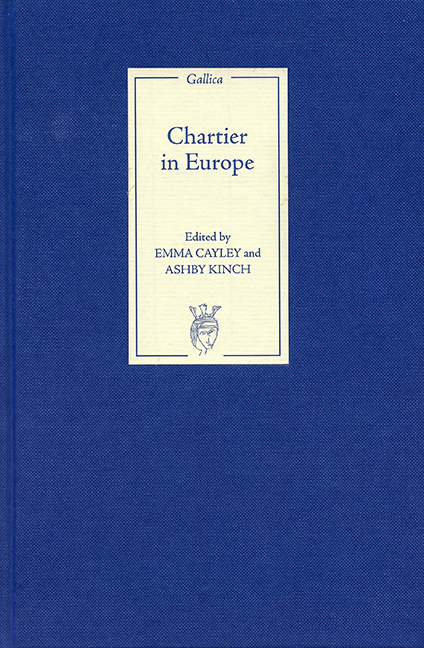Book contents
- Frontmatter
- Contents
- Foreword
- List of Contributors
- Acknowledgements
- List of Abbreviations
- Introduction
- Part I Authorising Chartier
- Part II Transmitting Chartier
- Part III Translating Chartier
- 8 From Invectivo to Inventivo: Reading Chartier's Quadrilogue invectif in Fifteenth-Century Castile
- 9 William Worcester Reads Alain Chartier: Le Quadrilogue invectif and its English Readers
- 10 The dit amoureux, Alain Chartier, and the Belle Dame sans mercy Cycle in Scotland: John Rolland's The Court of Venus
- 11 ‘La Crudele in amore’: Carlo del Nero Reads La Belle Dame sans mercy
- Bibliography
- Index
- Miscellaneous Endmatter
9 - William Worcester Reads Alain Chartier: Le Quadrilogue invectif and its English Readers
from Part III - Translating Chartier
Published online by Cambridge University Press: 24 October 2017
- Frontmatter
- Contents
- Foreword
- List of Contributors
- Acknowledgements
- List of Abbreviations
- Introduction
- Part I Authorising Chartier
- Part II Transmitting Chartier
- Part III Translating Chartier
- 8 From Invectivo to Inventivo: Reading Chartier's Quadrilogue invectif in Fifteenth-Century Castile
- 9 William Worcester Reads Alain Chartier: Le Quadrilogue invectif and its English Readers
- 10 The dit amoureux, Alain Chartier, and the Belle Dame sans mercy Cycle in Scotland: John Rolland's The Court of Venus
- 11 ‘La Crudele in amore’: Carlo del Nero Reads La Belle Dame sans mercy
- Bibliography
- Index
- Miscellaneous Endmatter
Summary
In the October and November of 1453, William Worcester (1415–c.1483), secretary to the famous veteran of the French wars, Sir John Fastolf (c.1380– 1459), was having parts of Alain Chartier's Quadrilogue invectif (1422) copied into one of his notebooks, now BL, MS Royal 13 C I. Worcester was an extremely active reader of Chartier's text: after the chosen passages of the text were copied into his notebook, Worcester then annotated them in Latin, highlighting both their utility and relevance for his own political agenda. Indeed, some of these passages found their way into Worcester's own composition, a Middle English prose treatise known as the Boke of Noblesse, composed and revised between 1453 and 1475. In this work, dedicated to Edward IV, Worcester drew on aspects of Chartier's text in order to argue for the importance of a new campaign in France, a campaign designed to reclaim the extensive territories the English had lost in Normandy and Aquitaine in the early 1450s.
Worcester was not the only English reader taking a keen interest in Chartier's text at this point. Far from it: the third quarter of the fifteenth century witnessed a flurry of interest in the Quadrilogue, alongside others of Chartier's works, emanating from a range of readers. Two independent Middle English translations of the Quadrilogue were made by two anonymous translators during this period, which circulated in a total of five manuscripts dating from the 1470s and 1480s. At the same time, at least one copy of the Quadrilogue in French was being produced and read in England. While Worcester was selecting and translating parts of Chartier's text for incorporation into one of his notebooks and into his own polemical treatise, Chartier's text was clearly generating wider interest in England.
This paper argues that these translations and manuscripts, and the traces readers left in them, provide suggestive evidence concerning the English reception of Alain Chartier's Quadrilogue in the aftermath of the Hundred Years’ War. The reception of his work among English readers can be mapped in several ways. As I have argued elsewhere, the two Middle English translators, far from corrupting or debasing Chartier's original text, were in fact creatively rewriting and reinterpreting the Quadrilogue for an English audience.
- Type
- Chapter
- Information
- Chartier in Europe , pp. 135 - 148Publisher: Boydell & BrewerPrint publication year: 2008

